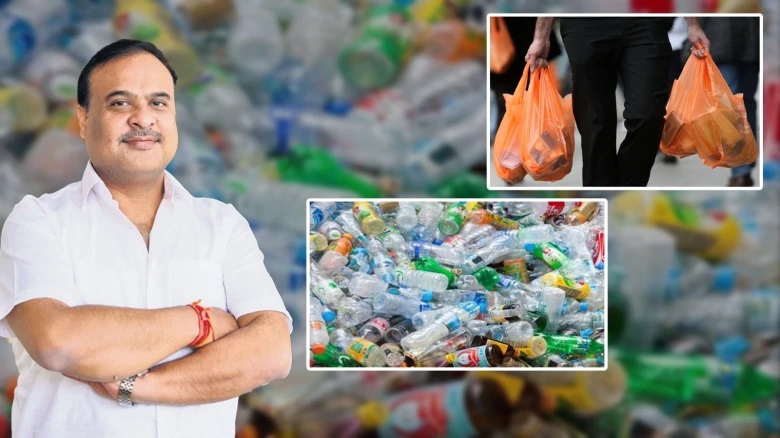Assam Takes Bold Step Towards a Greener Future: Ban on Single-Use Plastic Water Bottles Under 1000ml

In a significant stride towards a more environmentally conscious future, the Assam Environment and Forest Department has recently issued a groundbreaking notification, poised to put a halt to the use, manufacturing, import, stocking, distribution, sale, and consumption of plastic water bottles with a capacity below 1000 ml in the state. Set to be implemented from October 2, 2023, this move reflects Assam’s dedication to combatting plastic pollution and its adverse impacts on both the environment and human health.
The official notification states, “Whereas, single-use plastic (SUP) items, which have a very high littering potential, cause short-term and long-term environmental damage and pose a health hazard…The implementation of the provision of the notification shall vest in Urban and Rural local bodies, District Administration and Police department and Pollution Control Board of Assam. This Notification will come into effect from 2nd October, 2023.”
The decision comes on the heels of a proclamation by Assam Chief Minister Himanta Biswa Sarma, announcing the prohibition of single-use plastic water bottles with a capacity below one litre. This impending ban, set to take effect on October 2, marks a pivotal step in the state’s journey towards a cleaner and more sustainable path.
The ban resonates with Assam’s unwavering commitment to tackle the menace of plastic waste, recognizing the detrimental consequences it has on the environment. The ramifications of plastic pollution are felt globally, impacting not only human health but also marine ecosystems and wildlife. With this ban on single-use plastic water bottles, Assam aspires to address the pressing issue of plastic debris that frequently finds its way into rivers, lakes, and other natural habitats.
The crux of the matter lies in the concern surrounding single-use plastics. These items, often exemplified by the ubiquitous plastic water bottles, are designed for one-time use and are then disposed of. Unfortunately, their non-biodegradable nature means that they persist in the environment for an extended period, inflicting ecological harm in their wake.
Assam’s decision to curtail the use of plastic water bottles below 1000 ml capacity signifies a departure from the conventional norms and practices that have contributed to the proliferation of plastic waste. By taking this bold step, the state is exemplifying its determination to safeguard its natural heritage and enhance the quality of life for its residents.
This move is not merely a symbolic gesture; it is a manifestation of Assam’s commitment to foster a culture of sustainability. By restricting the usage of single-use plastic water bottles, the state is encouraging the adoption of more eco-friendly alternatives. This shift not only reduces the strain on landfills and ecosystems but also promotes responsible consumption patterns among citizens.
The timing of this ban is noteworthy, aligning with the global movement to mitigate plastic pollution and curb the escalating environmental crisis. As awareness about the detrimental effects of plastic waste grows, nations and regions worldwide are acknowledging the urgency of collective action. Assam’s ban on plastic water bottles under 1000 ml serves as a testament to its alignment with these global objectives.
While the ban on single-use plastic water bottles sends a clear message about the state’s environmental consciousness, it also prompts a broader reflection on the larger plastic waste issue. The ban is a critical step, but it also highlights the need for systemic changes that address the entire lifecycle of plastic production and consumption. It underscores the importance of promoting a circular economy, encouraging recycling, and exploring sustainable packaging alternatives.
As Assam gears up to implement the ban, it paves the way for innovative solutions that could inspire other regions to follow suit. Initiatives like these have the potential to trigger a ripple effect, encouraging individuals, businesses, and policymakers to reassess their relationship with plastic and adopt greener alternatives.
News Mania Desk / Agnibeena Ghosh 26th August 2023






